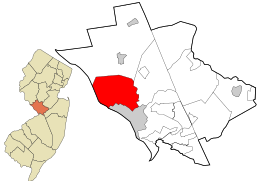Ewing Township, New Jersey
| Ewing Township, New Jersey | ||
|---|---|---|
| Township | ||
| Township of Ewing | ||

Benjamin Temple House
|
||
|
||
 Location in Mercer County and the state of New Jersey. |
||
 Census Bureau map of Ewing Township, New Jersey |
||
| Coordinates: 40°15′46″N 74°47′54″W / 40.262722°N 74.798307°WCoordinates: 40°15′46″N 74°47′54″W / 40.262722°N 74.798307°W | ||
| Country | ||
| State |
|
|
| County | Mercer | |
| Incorporated | February 22, 1834 | |
| Named for | Charles Ewing | |
| Government | ||
| • Type | Faulkner Act (Mayor-Council) | |
| • Body | Township Council | |
| • Mayor | Bert H. Steinmann (D, term ends December 31, 2018) | |
| • Administrator | James McManimon | |
| • Clerk | Kim J. Macellaro | |
| Area | ||
| • Total | 15.599 sq mi (40.400 km2) | |
| • Land | 15.250 sq mi (39.497 km2) | |
| • Water | 0.349 sq mi (0.903 km2) 2.23% | |
| Area rank | 174th of 565 in state 8th of 12 in county |
|
| Elevation | 125 ft (38 m) | |
| Population (2010 Census) | ||
| • Total | 35,790 | |
| • Estimate (2015) | 36,486 | |
| • Rank | 66th of 565 in state 3rd of 12 in county |
|
| • Density | 2,346.9/sq mi (906.1/km2) | |
| • Density rank | 259th of 565 in state 5th of 12 in county |
|
| Time zone | Eastern (EST) (UTC-5) | |
| • Summer (DST) | Eastern (EDT) (UTC-4) | |
| ZIP codes | 08560, 08618, 08628, 08638 | |
| Area code(s) | 609 | |
| FIPS code | 3402122185 | |
| GNIS feature ID | 0882128 | |
| Website | www |
|
Ewing Township is a township in Mercer County, New Jersey, United States. The township is within the New York metropolitan area as defined by the United States Census Bureau. It also directly borders the Philadelphia metropolitan area and is part of the Federal Communications Commission's Philadelphia Designated Market Area. As of the 2010 United States Census, the township's population was 35,790, reflecting an increase of 83 (+0.2%) from the 35,707 counted in the 2000 Census, which had increased by 1,522 (+4.5%) from the 34,185 counted in the 1990 Census.
The earliest inhabitants of present-day Ewing Township in the historic era were Lenni Lenape Native Americans, who lived along the banks of the Delaware River. Their pre-colonial subsistence activities in the area included hunting, fishing, pottery-making, and simple farming. Europeans, mostly from the British Isles, began to colonize the area in the 17th and 18th centuries. One of the earliest European settlers was William Green, and his 1717 farmhouse still stands on the campus of The College of New Jersey.
The area that is now Ewing Township was part of Hopewell Township in what was a very large Burlington County at the beginning of the 18th century. In 1714 Hopewell was removed from Burlington County and added to Hunterdon County. By 1719, the area which was to become Ewing Township had been removed from Hopewell Township and added to the newly created Trenton Township. Portions of Trenton Township were incorporated as Ewing Township by an act of the New Jersey Legislature on February 22, 1834, posthumously honoring Charles Ewing for his work as Chief Justice of the New Jersey Supreme Court. The township became part of the newly created Mercer County on February 22, 1838. After incorporation, Ewing Township received additional territory taken from Lawrence Township and the city of Trenton in 1858. In 1894 the city of Trenton took back some of that territory, annexing more in 1900.
...
Wikipedia

